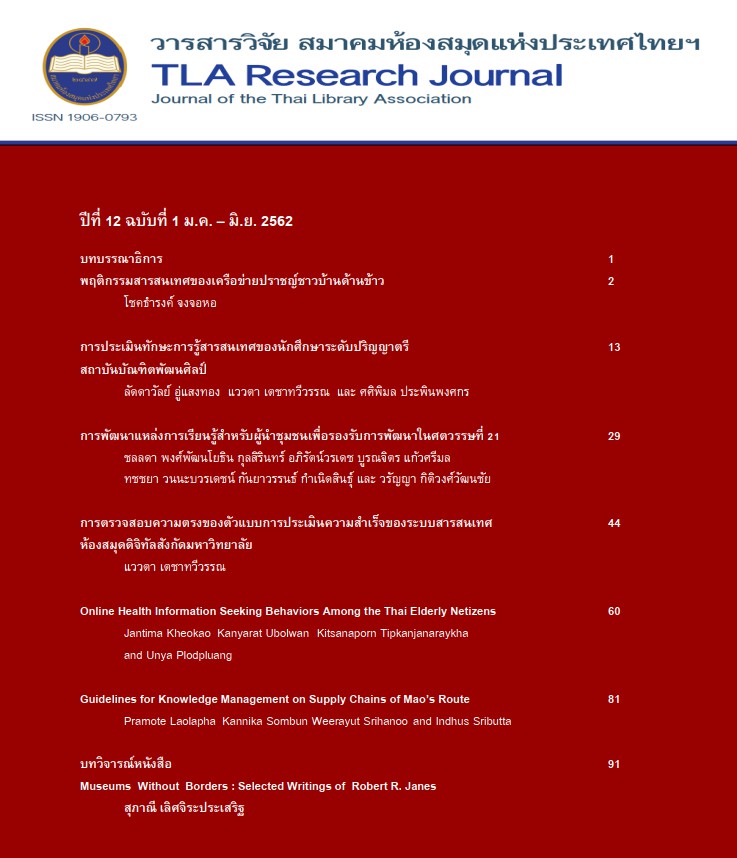Guidelines for Knowledge Management on Supply Chains of Mao’s Route
Main Article Content
Abstract
This qualitative research has objectives to study the knowledge management process and the guidelines for knowledge management on supply chains of Mao’s route. The key informants were three Mao farmers and three Mao processing entrepreneurs. Data were collected by using focus group interview and non-participant observation. Data were analyzed by using content analysis. The research results reveal that the knowledge management on supply chains of Mao’s route consists of 4 chains namely Mao planting, Mao processing, Mao marketing, and Mao’s academic sector. These chains are driven by the knowledge management process for developing the route of Mao, which involves the knowledge identification, knowledge acquisition and creation, knowledge storage, Knowledge evaluation, Knowledge usage, and knowledge sharing. The discovered solutions for knowledge management on supply chains of Mao’s route include increasing the Mao growing area, zoning Mao plantations that match the variety of Mao, organizing the data recording, developing Mao orchards to become sources for learning and conserving Mao breeds, developing new products, maintaining quality of Mao products, establishing a coaching system, improving the marketing strategies, employing the barcode technology on the packages, promoting online sales, considering benefits of consumers, and operating with a Mao-loving mind.
Article Details
บทความทุกเรื่องที่ลงตีพิมพ์จะได้รับการตรวจอ่านโดยผู้ทรงคุณวุฒิ ความคิดเห็นและบทความที่ปรากฏในวารสารนี้ เป็นของผู้เขียนซึ่งมิใช่เป็นความคิดเห็นของคณะผู้จัดทำ และมิใช่ความรับผิดชอบของสมาคมห้องสมุดแห่งประเทศไทยฯ การนำบทความในวารสารนี้ไปตีพิมพ์ซ้ำต้องได้รับอนุญาตจากคณะผู้จัดทำ
All articles submitted for publication will be reviewed by the academic reviewers. The editorial board and TLA claim no responsibility for the content or opinions expressed by the authors of individual articles or columns in this journal. Reprinting of any articles in this journal must be permitted by the editorial board.
References
Kuljittiwirach, S. (2012). Knowledge Management of Indigo Dye Cloth Weaving in Ban Non Sa-at, NaNgua Sub-District, Nawa District, Nakhon Phanom Province. Master Thesis, M.S. in Agricultural Extension and Development, Khon Kaen University, Thailand. [In Thai]
Liebowitz, J. (Ed.). (1999). Knowledge Management Handbook. London: CRC Press.
Naksawad, K. (2013). Announcement of Mak Mao Sakonnakhon Club entitled: Specification on buying/selling prices of Mak Mao fruits for the production season of 2013. Sakon Nakhon province: Mak Mao Sakon Nakhon Club. (photocopied). [In Thai]
Office of the National Economic and Social Development Board. (2011). the Eleventh National Economic and Social Development Plan (2012-2016). Bangkok, Thailand: NESDB. [In Thai]
Pranakorn, R., Sakunkoo, S. & Somboon, K. (Eds.). (2006). Summary of Work Results the 5th Mak Mao Day Festival in Sakon Nakhon province. Sakon Nakhon province: Faculty of Natural Resources, Rajamangala University of Technology Isan Sakon Nakhon Campus. [In Thai]
Prasertchai, A. (2017). Knowledge management, research and innovation. Retrieved June 9, 2017, from http://www.stou.ac.th/Schools/Shs/booklet/book541/km.html [In Thai]
Somboon, K. (2006). Processed products from Mao: Goods from Sakon Nakhon Province with Potential for Development. In Ratree Pranakorn, Sudarat Sakunkoo, & Kannika Somboon (Eds.), Summary of Work Results the 5th Mak Mao Day Festival in Sakon Nakhon province (pp. 7-10). Sakon Nakhon province: Faculty of Natural Resources, Rajamangala University of Technology Isan Sakon Nakhon Campus. [In Thai]


